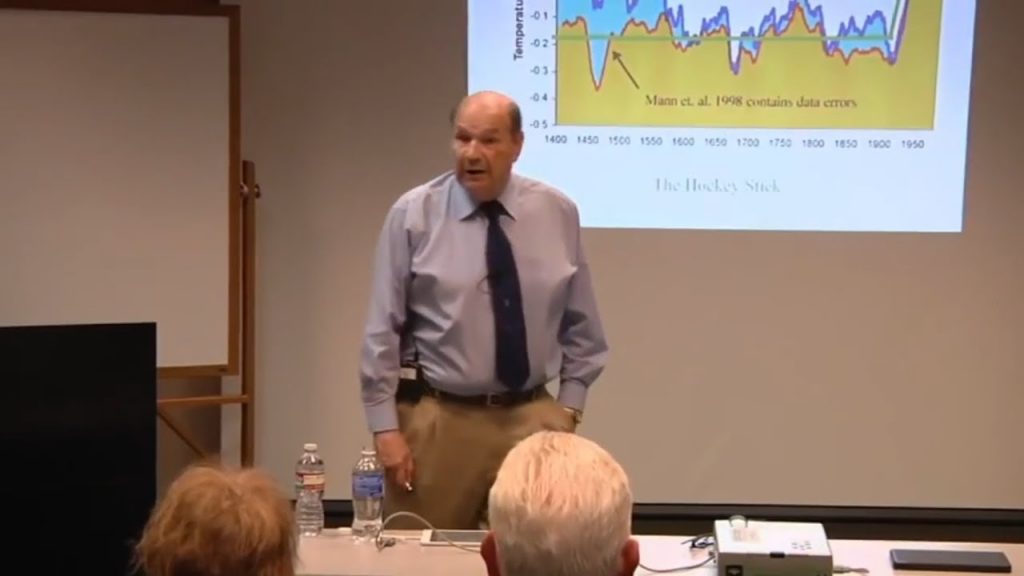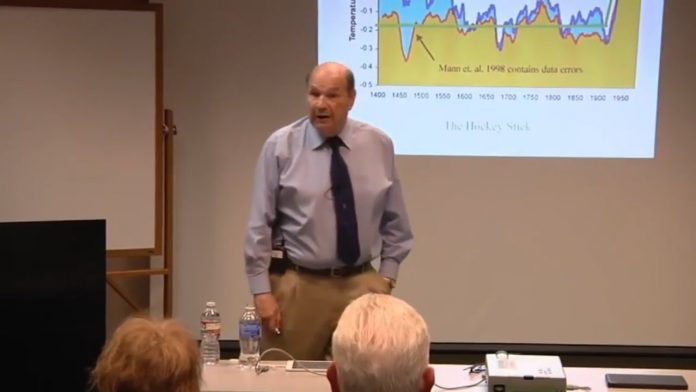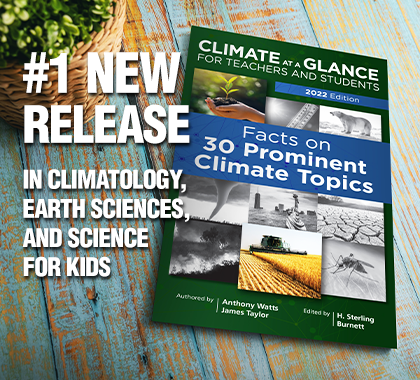YOU SHOULD SUBSCRIBE TO CLIMATE CHANGE WEEKLY.
IN THIS ISSUE:
-
In Memoriam: Timothy Ball, Ph.D., Fierce Defender of Science
-
Podcast of the Week: How Atlantic Ocean Wind Projects Will Kill Endangered Whales
-
More Research Confirms Climate Models Run Too Hot, Expected Warming is Not Alarming
-
Climate Comedy
-
Video of the Week: Hurricane Ian Isn’t Proof of Anthropogenic Climate Change
-
BONUS Video of the Week: Draining The Strategic Petroleum Reserve
-
Recommended Sites
In Memoriam: Timothy Ball, Ph.D., Fierce Defender of Science

Timothy Ball, Ph.D. passed away on September 24. I’m truly sorry to have to write this. I had few personal encounters with Dr. Ball, unfortunately: a couple of phone interviews, some email exchanges, and brief hellos exchanged in passing at meetings we both attended.
Although I didn’t know him well, I followed and admired his work for years. Dr. Ball was a fighter for the use of the scientific method to explore the world and discover truth in all areas of science. In his last few decades he was perhaps best-known for doggedly using the scientific method in academia, in the popular media, and in court to expose the pseudo-science used to promote climate alarm. For his efforts, Ball received praise in the form of multiple awards, and he was sued by noted climate alarmist Michael Mann, Ph.D., of hockey stick infamy. (More on this later.)
Among the awards Dr. Ball received were the Clarence Atchison Award for Excellence in Community Service, the Clifford J. Robson Memorial Award for Teaching Excellence; and the Lifetime Achievement in Climate Science award by The Heartland Institute at the 13th International Conference on Climate Change in 2019. In a follow-up to his receipt of the latter award, I interviewed Dr. Ball for an article published in Environment & Climate News.
Below are a short bio of Dr. Ball; a brief remembrance by Joe Bast, former long-time president of The Heartland Institute; and excerpts of a post from the Manhattan Contrarian blog discussing the court case for which Ball is perhaps most famous.
Brief biography, Timothy Ball, Ph.D.
Dr. Timothy Ball received a bachelor’s degree with honors in geography from the University of Winnipeg in 1970, followed by an M.A. from the University of Manitoba in 1971 and a Ph.D. in geography with a focus on historical climatology from Queen Mary University of London, England in 1983. His dissertation was titled, “Climatic Change in Central Canada : A Preliminary Analysis of Weather Information from the Hudson’s Bay Company Forts at York Factory and Churchill Factory, 1714-1850.”
Dr. Ball joined the University of Winnipeg faculty in 1971, retiring as a full professor in 1996. Ball then served as chief science advisor to the International Climate Science Coalition and a policy advisor to The Heartland Institute.
Dr. Ball was a researcher and author of scientific papers on a range of environmental issues, including a coauthored paper in the scientific journal Ecological Complexity titled “Polar bears of western Hudson Bay and climate change: Are warming spring air temperatures the ‘ultimate’ survival control factor?”
Ball was one of several authors of Slaying the Sky Dragon: Death of the Greenhouse Gas Theory, published in 2011. In 2014 Ball wrote the book The Deliberate Corruption of Climate Science. Ball’s most recent solo effort discussing climate change is Human Caused Global Warming, with the attention-grabbing subtitle “The Biggest Deception in Human History.”
As one can see from the titles of Dr. Ball’s books, he was not one to hide his true thoughts or shy away from controversy or an academic or, as it turns out, a legal fight.
From Joe Bast:
Tim Ball, Ph.D., was part of the first generation of modern climatologists trained to understand and study Earth’s climate “in the round” rather than just one or a few aspects of it. He had the misfortune of watching his discipline succumb to the temptations of government funding, media attention, and specialization that have caused so much damage climate science and to other scientific disciplines.
For all his stellar work, Ball is perhaps best-known for his trenchant critique of Michael Mann’s widely disputed “hockey stick” reconstruction of the Earth’s recent temperature history and the hiding of the data Mann and his colleagues used to develop the widely cited graphic. Ball’s critique resulted in him being sued for libel by Mann. Frances Menton of the Manhattan Contrarian described the lawsuit well, including Ball’s ultimate vindication. I excerpt his comments here:
Ball was that rarity of a climate scientist in the world of academia with the temerity and courage to say and repeat that CO2 is a beneficial gas. He would not back down, in a world that rapidly went insane and became increasingly intolerant and hostile to his position. Notably, Ball did not shy away from calling out the biggest scamsters of the climate hustle, most particularly one Michael Mann. Mann is the professor at Penn State who was the lead creator of the IPCC’s iconic “hockey stick” graph that has been used to sell global warming hysteria to the world for the last 20+ years.
SOURCES: Wikipedia; Manhattan Contrarian; ICCC 13; The Heartland Institute
Podcast of the Week
The Heartland Institute has joined allies in hiring a law firm to fight the wind power project off the coast of Virginia that may end the existence of the North Atlantic right whale.
Heartland Institute President James Taylor joined the “Mike Ferguson in the Morning” show in St. Louis to talk about Heartland’s involvement in an effort to protect the North Atlantic right whale — of which there are only about 300 left — as well as how other supposedly “green” energy projects have turned what we think of environmentalism on its head. Wind power companies can kill thousands of birds and bats, many of them endangered, with no penalty from the government. But if a random bird dies on the property of a conventional energy plant, the feds drop the hammer.
Subscribe to the Environment & Climate News podcast on Apple Podcasts, iHeart, Spotify or wherever you get your podcasts. And be sure to leave a positive review!
Get your Copy at Amazon TODAY!
More Research Confirms Climate Models Run Too Hot, Expected Warming is Not Alarming

Two peer-reviewed papers from 2022 confirm what previous research has shown and IPCC modelers admit: climate model projections of temperatures run too hot. Because the findings are not alarming, these studies have received little media attention.
In a study published in Climate Dynamics, Nicholas Lewis uses a Bayesian method of statistical analysis to estimate “climate sensitivity” to a doubling of carbon dioxide in the atmosphere from preindustrial levels, and its effect on temperatures. Bayesian analysis combines prior information about a phenomenon and established parameters to assign probabilities to a future range of events. The result of this analysis, as described by the author:
The resulting estimates of long-term climate sensitivity are much lower and better constrained (median 2.16°C, 17–83% range 1.75–2.7°C, 5–95% range 1.55–3.2°C) than in Sherwood et al. and in AR6 (central value 3°C, very likely range 2.0–5.0°C). This sensitivity to the assumptions employed implies that climate sensitivity remains difficult to ascertain, and that values between 1.5°C and 2°C are quite plausible. [Emphasis added.]
One wonders how many studies must show climate models are seriously flawed, or how many times modelers must grudgingly admit their models don’t accurately simulate the climate, before the IPCC and the media admit governments should not use their projections of future climate conditions in setting energy and environmental policies.
SOURCES: Geophysical Research Letters; Climate Dynamics
Heartland’s Must-read Climate Sites
Video of the Week: Hurricane Ian Isn’t Proof of Anthropogenic Climate Change
As expected, the corporate media latched onto Hurricane Ian to advance the false narrative of anthropogenic, catastrophic climate change. Rather than dedicate airtime to informing the public on key developments, alarmists are capitalizing on this devastating weather event to scare the public into submission.
BONUS Video of the Week: Draining The Strategic Petroleum Reserve
The Heartland Institute’s Donald Kendal, Justin Haskins, and Chris Talgo present episode 366 of the In The Tank Podcast. In response to OPEC’s announcement that they were going to be lowering oil production, the Biden Administration said they were going to further release oil from the Strategic Petroleum Reserve. The ITT crew discusses why the administration is doing this. Also, several months after Biden signed an executive order about Central Bank Digital Currency, the White House released a fact sheet about there plans to move forward with a CBDC.






























